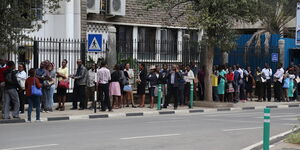Several elected leaders including Governors, Senators, Members of Parliament and Ward Representative risk losing their seats, after Registrar of Political Parties asked parties to present list of leaders who had defected for disciplinary action.
According to Section 14 of the Political Parties Act, "a person is deemed to have resigned from his party if he forms, sells ideals, interests and policies of another party notwithstanding the provisions of any other written law.”
The Registrar, Lucy Ndung’u, directed political parties to forward names of the 'rebel leaders' so that her office could present them to the Independent Electoral and Boundaries Commission (IEBC), to start the process of declaring the seat vacant.
“If a political party takes a decision to mean that a person has resigned by propagating the ideals of another party, my office is ready to do its job. We will communicate to the electoral commission to complete the punishment,” Ndung'u was quoted by the Nation.
Bomet Governor Isaac Ruto has been on the headlines drumming support for his newly formed Mashinani Development Party while denouncing his 2013 political vehicle, United Republican Party (URP).
Machakos Governor Alfred Mutua also may lose his seat as his movement Maendeleo Chap Chap Movement is seen as a defection from Wiper party and has highly been condemned by the party leader Kalonzo Musyoka.
West Pokot Governor Simon Kachapin who has been on the record stating that he would gladly work with Jubilee also risks losing his seat.
Kachapin dared his KANU counterparts to expel him stating that he was elected by the people.
Several lawmakers in the CORD coalition have also announced their intentions to work with Jubilee come 2017 General Elections.
The legislators include, Masoud Mwahima (Likoni), Gideon Mung'aro (Kilifi North), Suleiman Mwashetani ( Lunga Lunga), Peter Shehe (Ganze), Salim Mustapha (Kilifi South), James Kamoti (Rabai).
Read Also: CORD To Lose These MPs To Jubilee
The registrar however, indicated that it was upon the parties to decide whether the 'rebel leaders' be punished or not.












